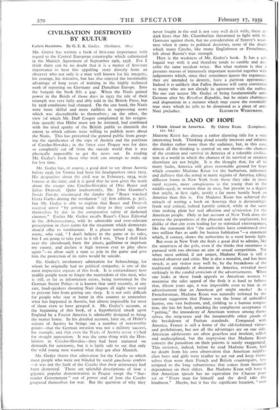CIVILISATION DESTROYED BY KULTUR Fallen Bastions. By G. E. R.
Gedye. (Gollancz. t6s.)
MR. GEDYE has written a book of first-rate importance with regard to the Central European catastrophe which culminated in the Munich Agreement of September 29th, 1938. For I think there can be no doubt that it is a matter of first-rate importance to hear this appalling story directly from an observer who not only is a man well known for his integrity, his courage, his initiative, but has also enjoyed the inestimable advantage of long years of training in the highly technical work of reporting on Germany and Danubian Europe. Into the bargain the book fills a gap. When the Nazis gained power in the Reich of those days in 1933 the tale of their triumph was very fully and ably told in the British Press, but by 1938 conditions had changed. On the one hand, the Nazis were more skilful and more ruthless in suppressing news which was discreditable to themselves ; on the other, the view (of which Mr. Duff Cooper complained in his resigna- tion speech) that Hitler must not be irritated, had combined with the tired apathy of the British public to diminish the extent to which editors were willing to publish news about the Nazis. This has prevented the general public from grasp-
ing the significance of the rape of Austria and the partition of Czecho-Slovakia ; in the latter case Prague was for days so completely cut off from the outside world that it was physically impossible to get the news out. In reading Mr. Gedye's book those who wish can attempt to make up for lost time.
Mr. Gedye has, of course, a good deal to say about Austria before 1938, for Vienna had been his headquarters since 1925. His despatches about the civil war in February, 1934, were famous at the time, and it is good that he now gives the truth about the escape into Czecho-Slovakia of Otto Bauer and Julius Deutsch. Quite inadvertently, Mr. John Gunther's Inside Europe encouraged the slander that " Bauer watched Greta Garbo during the revolution " (cf. first edition, p. 302), but Mr. Gedye is able to explain that Bauer and Deutsch escaped arrest " by getting such sleep as they could allow themselves by day in the comparative safety of darkened cinemas." Earlier Mr. Gedye recalls Bauer's Chess Editorial in the Arbeiterzeitung, with its admirable and ever-relevant prescription in chess terms for the treatment which democrats should offer to totalitarians. If a player turned up, Bauer wrote, who said, " I don't believe in the game or its rules, but I am going to take part in it till I win. Then I shall kick over the chessboard, burn the pieces, guillotine or imprison my enemy, and declare it high treason ever to play chess again "—to allow such a man to join in the game and give him the protection of its rules would be suicide.
Mr. Gedye's involuntary admiration for Schuschnigg, for whom he originally had no political sympathy, is one of the most impressive aspects of this book. It is extraordinary how readily people seem to forget the martyrdom of this man, who is still, as far as information exists, being tormented by the German Secret Police—it is known that until recently, at any rate, loud-speakers shouting Nazi slogans all night were used to prevent him from getting any sleep. It is not only difficult for people who stay at home in this country to remember what has happened in Austria, but almost impossible for most of them even to have grasped it. Mr. Gedye's account, at the beginning of this book, of a hypothetical attack upon England by a Fascist America is admirably designed to bring the matter home. In his detailed account, later on, of Hitler's seizure of Austria he brings out a number of noteworthy points—that the German invasion was not a military success, for example, and that even the Nazis of Austria never wished for straight annexation. It was the same thing with the Hen- leinists in Czecho-Slovakia—they had been nurtured on demands for autonomy, but it is fairly safe to say that only the wild young men wanted what they got after Munich.
Mr. Gedye shares that admiration for the Czechs to which most people who were not blinded by social gaucherie confess —it was not the fault of the Czechs that their aristocracy had been destroyed. There are splendid. descriptions of how a gigantic popular demonstration in Prague swept the " Sur- render Government " out of power and of how the Czechs prepared themselves for war. But the question of why they never fought in the end is not very well dealt with; there atN: dark hints that Mr. Chamberlain threatened to fight with the Germans against them, but no consideration of Syrovy's weak- ness when it came to political decisions, none of the doubt which many Czechs, like many Englishmen or Frenchmen, felt about Russia's true strength.
Here is the weakness of Mr. Gedye's book. It has a col- loquial way with it and therefore tends to ramble and des- cribe the same incident twice. But what matters is that it presents masses of immensely important material together with judgements which, since they sometimes ignore the arguments they are intended to destroy, have a partisan appearanc'. Indeed it is unlikely thai Fallen Bastions will carry conviction to many who are not already in agreement with the author. No one can accuse Mr. Gedye of being fundamentally anti- German after his Revolver Republic, but he mixes chattiness and dogmatism in a manner which may cause the essentially true story which he tells to be dismissed as a piece of anti-










































 Previous page
Previous page